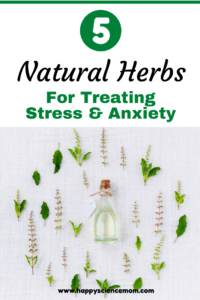 Many common herbs can provide enormous health benefits for you and your family. These herbs work with little to no side effects and can be used in delicious ways. Read on to discover some of the herbs that are known for supporting general health and addressing conditions including symptoms related to stress and anxiety.
Many common herbs can provide enormous health benefits for you and your family. These herbs work with little to no side effects and can be used in delicious ways. Read on to discover some of the herbs that are known for supporting general health and addressing conditions including symptoms related to stress and anxiety.
Peppermint
Peppermint is a time-tested home remedy for complaints involving the digestive system, which are often linked to stress. Peppermint can soothe nausea, calm upset stomachs, reduce abdominal bloating, and fight pain from ailments such as Irritable Bowel Syndrome. It has a long history in homeopathic healing and has been the subject of a variety of medical studies. Peppermint can deliver its benefits when used in aromatherapy, when applied topically, or when ingested such as through delicious peppermint tea.
Lavender
The word lavender probably conjures up images of pastel purple and beautiful, fragrant flowers, but this herb’s uses go far beyond decoration. Lavender has a variety of health benefits related to stress. For example, it may help combat insomnia and improve sleep quality. Its aroma is known to boost mood and help people relax and destress. Plus, it shows promise as a natural pain reliever and has anti-inflammatory properties. Lavender can be used in aromatherapy, used topically as with lavender essential oil diluted in a carrier oil, or it can be made into a lovely and very healthy tea.
Holy Basil
Holy basil, more commonly known as tulsi, is a wonderful and adaptable herb. Benefits include protecting the heart, liver, and brain; combatting stress and its negative effects on the body; aiding in the maintenance of stable blood sugar levels; and promoting longevity and general health. Tulsi is highly regarded in both Eastern and Western medicine. It can be used to help with the symptoms of many illnesses including diabetes, the common cold, headache, fever, stress, upset stomach, earache, and more. Additionally, studies have found that the herb is what is known as an “adaptogen,” meaning that it helps boost the body’s resilience in dealing with stress. As an adaptogen, holy basil is very good for you: in addition to boosting the immune system, it helps balance hormones and even improves brain function. Tulsi can be made into tea; its leaves can be used as a flavoring when cooking, especially for Asian dishes; or tulsi essential oil can be used for aromatherapy or diluted for topical application.
Ginger
Ginger is regarded as one of the healthiest spices; it is loaded with nutrients that benefit your body and brain. In addition to being a delicious flavoring, ginger offers many health benefits. It aids in digestion, calms an upset stomach, relieves nausea, reduces gas and bloating, helps reduce inflammation and relieve pain, supports heart health, and may help lower the risk of cancer. Ginger can be used fresh, dried, powdered, as an oil or juice, or as a tea. In addition, its essential oil can be used in aromatherapy or diluted for topical use.
Rosemary
Rosemary is known for having a variety of potential health benefits. The herb can protect the brain against the processes of aging, possibly lower the risk of cancer, provide antioxidants and anti-inflammatory compounds that reduce inflammation and pain, and help prevent cellular damage. What’s more, rosemary is known for improving both memory and digestion.
Have you tried herbs to ease stress?




